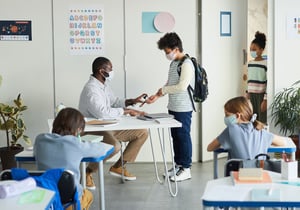Mentoring could be a key tool in K-12’s COVID recovery, particularly as evidence of the inequitable academic impacts of the pandemic mount.
More than 80% of teachers said mentors—trusted adults who get to know and support individual students—improve academic performance and also help students become more independent learners, according to a survey by Gradient Learning.
Moreover, mentoring substantially increases the likelihood students will volunteer in their community and hold leadership positions, the Gradient Learning survey found. Students who are mentored are also 55% less likely to skip school. And 85% of teachers said serving as a mentor increased their feelings of success, satisfaction and pride.
“The long periods of school closure during the COVID-19 pandemic deprive children of the equalizing force of education,” said Yale economist Fabrizio Zilibotti, a co-author of the study. “Our analysis shows the pandemic is widening educational inequality and that the learning gaps created by the crisis will persist as students progress through high school, putting their future prospects at risk.”
Children in the poorest 20% of U.S. neighborhoods will suffer the longest-lasting effects of school closures. The study’s model predicts that a year of closures in these communities will decrease 9th-graders’ future earning potential by 25% even if they return to normal schooling over the next three years. However, the study forecasts no substantial loss for students living in the richest 20% of neighborhoods.
In the poorest neighborhoods, remote learning resulted in a half-point drop in a 9th-grader’s grade-point average. For example, a student who earned straight Bs pre-COVID would get Cs in half of their subjects during virtual instruction, and some of that gap will persist through high school.
On the other hand, students in the most affluent neighborhoods made slight gains, which the researchers attributed to wealthier parents having ample time and resources to support students learning remotely.
Students in poorer neighborhoods were also more deeply impacted by reduced interaction with students from different socioeconomic backgrounds. The findings should guide policymakers in prioritizing the opening of schools over other economic sectors and mitigating the pandemic’s impacts by providing increased services to disadvantaged students, the researchers concluded.
“Especially in older children, peer interactions are a crucial ingredient in academic success,” said Zilibotti. “We found that the inability to be with friends and mingle with peers from different socioeconomic groups did more damage to children’s educational progress than any other factor, including virtual learning. It underscores the importance of having kids from across the socioeconomic spectrum learning together.”


COMMENTS